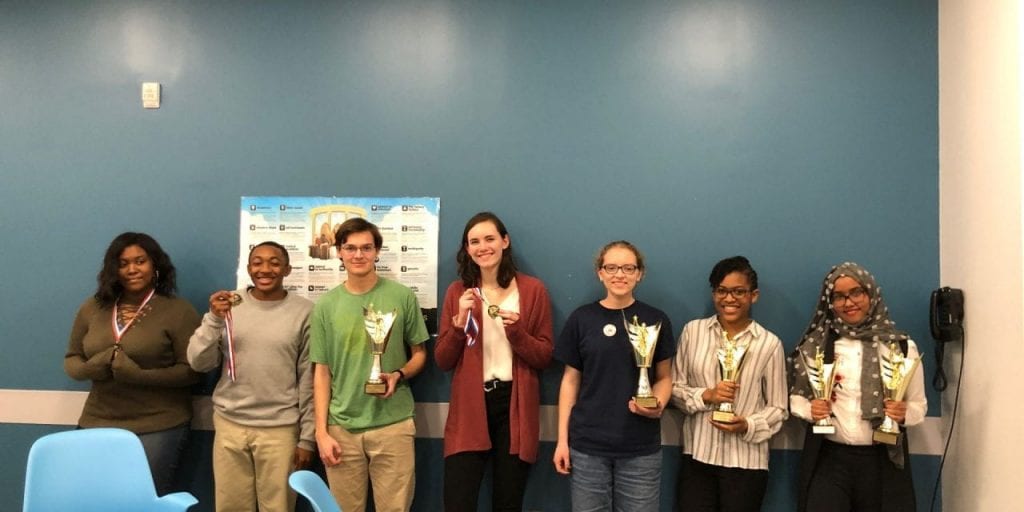Earlier this month, I welled with pride watching confident Southern High School students participate in an articulate, well-argued, impassioned Congressional debate on a bill raising the minimum wage. As their CA peer-mentors cross-examined them, both sides lighting up in delight from the equal intellectual exchange, I was struck by how far we have come and by how much the students on both sides of the table have learned in such a short time.
You see, a year ago, Southern, like so many high schools across the country, did not have access to a debate program.
The benefits that students reap from participating in a speech and debate program—including the development of crucial skills such as critical thinking, advocacy, research, public speaking, and organization, and even heightened civic engagement and awareness—are well documented.
Yet, speech and debate—particularly the debate part of the program—has increasingly become a domain of privilege, dominated by independent schools or other highly-ranked public schools across the nation. While the last ten years have seen more women join in the debate ranks, racial and ethnic diversity remains a challenge, particularly among African American and LatinX students.
Looking around the Triangle, we mirror that national trend. Cary Academy, Durham Academy, Enloe High School, and Research Triangle High School represent the vast number of local students engaged in Lincoln Douglas, Public Forum, and Congressional debate. No public schools in Durham have access to debate team competition and only a handful of schools provide that opportunity in Wake County. It is simply too expensive to coach, travel, and provide the necessary resources to be competitive.
Two years ago, inspired by the work of the national organization, the Urban Debate League, CA’s Speech and Debate program started to think about how CA might address this inequality and brainstormed ways we could give back to our community.
How could we harness our resources to help provide the tools to students who have neither access to a speech and debate program nor the resources to compete? How could we—in the parlance of CA’s strategic plan—forge strong connections within our community and capitalize on opportunities to share our knowledge, inspiration, and innovation in ways that could decrease this disparity? How could we use this as an opportunity to foster authentic engagement between our students and the diverse communities outside of CA?
Fortunately, the stars lined up perfectly. We met a Duke student who was similarly passionate about bringing speech and debate to a broader community of students and who was willing to provide the necessary infrastructure to offer coaching at local Durham high schools. Next, we found three highly motivated and dedicated teachers at Jordan, Hillside, and Southern who shared our mission. And, finally, we secured Dr. Ehrhardt’s enthusiastic support. After establishing a board and nonprofit status, the Triangle Debate League (TDL) was born.
TDL brings speech and debate to public schools that don’t have the staff or funds to support the activity. Beginning in the 2018-2019 year, we began teaching Congressional Debate at three high schools in Durham.
In collaboration with our student-coaches from UNC and Duke and CA faculty, CA’s speech and debate students participate in TDL as volunteer peer-mentors, sharing their knowledge, helping with research, serving as judges, offering critique, and participating in group activities.
The exchange, however, has hardly been unidirectional.
On the contrary, what has been perhaps one of the more powerful dimensions of this project is the two-way learning that has happened and the connections that have been forged between our CA student mentors and their peer-participants.
Take for example, one training session where TDL mentors recommended that Southern High participants not only offer the cold, hard results of research and data collection in their arguments surrounding minimum wage, but to make their arguments more personal, to express their own connection and beliefs in their responses. In the next session, we heard from a student that provides financial support for their family; from another trying desperately to raise a few thousand dollars in hopes of paying for college; from another concerned about how wage changes would impact those paid under the table; and from another that analyzed whether higher minimum wage would raise or lower crime in their neighborhood. For one student, his mother’s recent job at minimum wage didn’t guarantee food in his home.
It was an incredibly eye-opening and meaningful learning experience for our CA student mentors and one that decidedly took them outside of their CA “bubble.”
TDL’s final tournament of the season is May 2 at CA (come on out if you want to watch a spirited debate!). As the season ends, we find ourselves excited for the developments that next year will bring.
Beginning in Fall of 2019, we will welcome up to three more schools to the TDL, bringing Wake County public schools into the program, as well as Northern High School in Durham. Additionally, we have reached out to North Carolina Central University, Shaw University, and North Carolina State University to bring more coaches on board to expand our support. We are adding Apex Friendship and Enloe High School to our participating student mentoring schools.
Things are looking up for Triangle Debate League. We are proud of our Cary Academy volunteers and all of those students learning and competing in debate!

